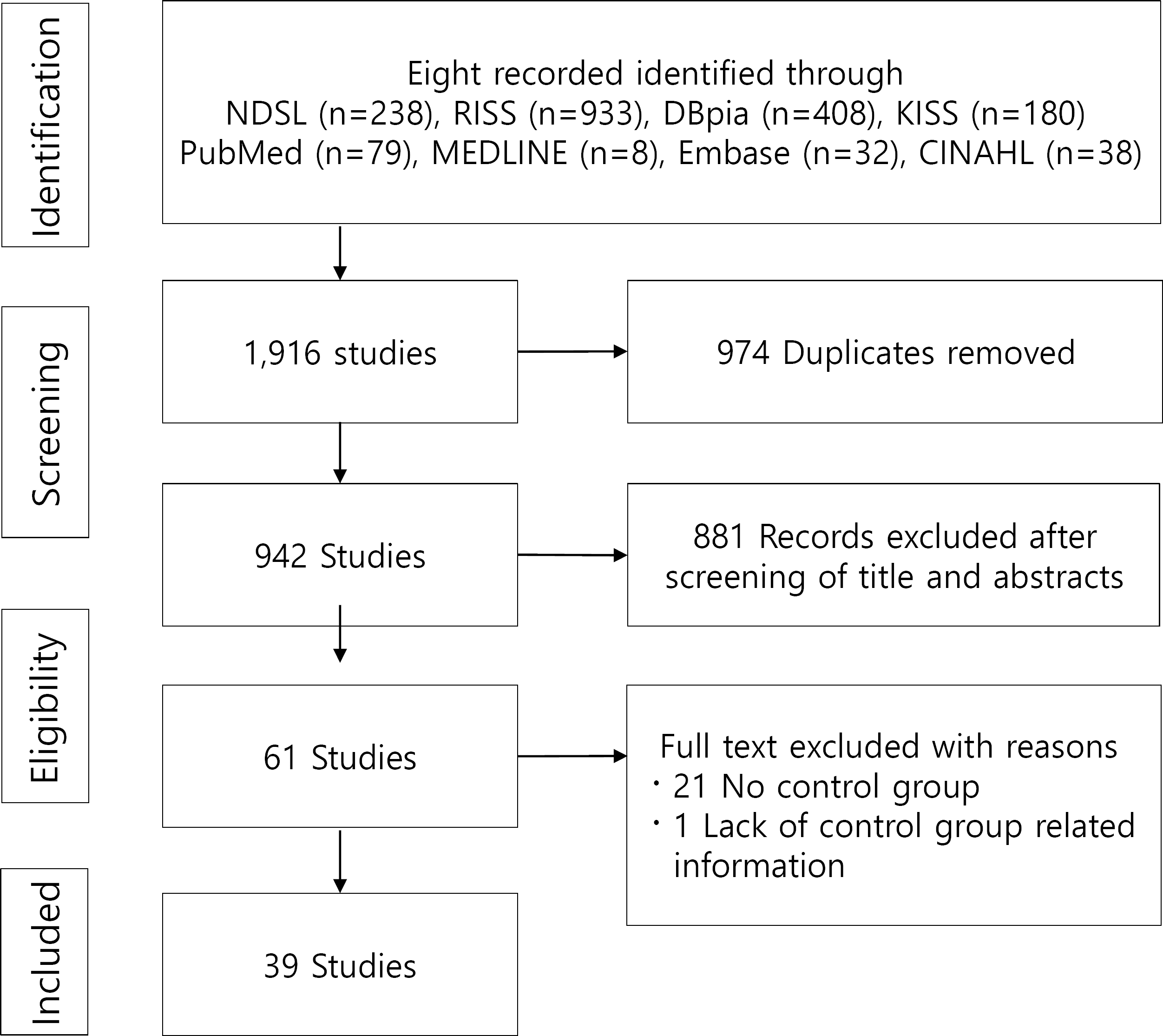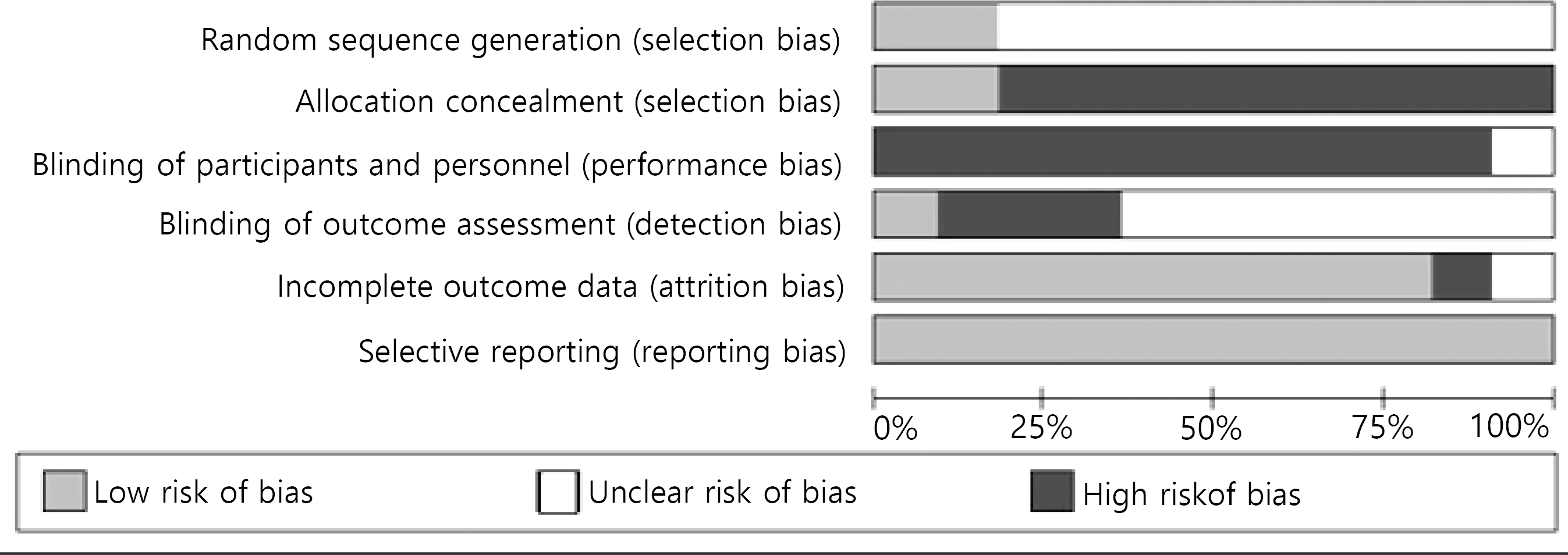Ahn HM., Kim MO. Analysis of health related intervention research for married immigrant women. J Digital Converg. 2016. 14:245–56.

Ahn JA., Kim T., Roh EH., Song JE. Health of international marriage immigrant women in South Korea: a systematic review. J Immigr Minor Health. 2018. 20:717–28.

Ahn OH., Jeon MS., Hwang YY., Kim KA., Youn MS. An analysis of articles for international marriage immigrant women related to health. J Agri Med Community Health. 2010. 35:134–50.

Butcher HK., Bulechek GM., Dochterman JM., Wagner CM. Nursing interventions classification (NIC). 7th ed. Saint Louis: Elsevier; 2018. Jeong SH. Group art therapy program on married migrant women–s depression, self-esteem, and marital satisfaction. Korean Assoc Clin Healing Arts. 2013. 2:61–94.
Jun HJ., Min SH., Lee MY., Choi HY. Path of the variables to migrant women–s families– health. Korean J Family Welf. 2009. 14:5–27.
Kim HJ., Kim JM. Cognitive behavioral therapy for improving parenting efficacy of married immigrant women. J Korean Home Manag Assoc. 2015. 33:135–48.

Kim J., Kim NC. Effects of birth control empowerment program for married immigrant Vietnamese women in South Korea. Korean J Women Health Nurs. 2017. 23:1–10.

Kim JH. The effect of folk song-oriented music therapy program on the reduction of cultural adaptation stress and depression in Chinese migrant women. Korean J Interdiscipl Ther. 2011. 3:21–32.
Kim SH., Noh YG. Influence of spousal support on the relationship between acculturative stress and sense of parenting competence among married Vietnamese immigrant women. Korean J of Women Health Nurs. 2018. 24:174–84.

Kim SY., Park JE., Seo HJ., Seo HS., Son HJ., Shin CM, et al. NECA–s guidance for undertaking systematic reviews and meta-analyses for intervention. Seoul (Korea): National Evidence-based healthcare Collaborating Agency;2011.
Kim TI., Kim JY., Choi SM., Jung GH. Analysis of intervention studies for married immigrant women. J Korean Acad Community Health Nursing. 2013. 24:172–84.

Lee EA. Urban marriage migrant women–s role of a mother and their identities: focusing on the experience of child education. J Korean Womens Stud. 2013. 29:115–46.
Lee HK., Jeon HI. The effects of perceived social support on marital satisfaction in married immigrant women: focused on the mediating effect of acculturative stress. Korean J Family Welf. 2013. 18:413–32.

Lee MO., Kim SH. Meta-analysis about the effectiveness of intervention programs for married immigrant women. Korean J Women Health Nurs. 2015. 21:342–54.

Lee SH., Park YC., Hwang J., Im JJ., Ahn D. Mental health of intermarried immigrant women and their children in South Korea. J Immigrant Minority Health. 2014. 16:77–85.

Lee SO., Kim GS., Choi YK. Nursing process. Seoul (Korea): Korea National Open University;2016.
Ministry of Gender Equality and Family. Raw-data of national survey of multicultural families 2019. Seoul (Korea): Ministry of Gender Equality and Family;2020.
Ministry of Justice, Korea Immigration Service. Korea immigration service statistics 2019. Gwacheon (Korea): Ministry of Justice, Korea Immigration Service;2020.
Ministry of the Interior and Safety. Foreign residents of local governments in 2018. Ministry of the interior and safety [Internet]. Sejong (Korea): Ministry of the Interior and Safety;2019 Oct. [cited 2021 Jan 5]. Available from:. https://www.mois.go.kr/frt/bbs/type001/commonSelectBoardArticle.do?bbsId=BBSMSTR_000000000014&nttId=73857.
Moorhead S., Swanson E., Johnson M., Maas ML. Nursing outcomes classification (NOC): measurement of health outcomes. 6th ed.Saint Louis: Elsevier;2018.
Park MN., Choi SY. Development of reproductive health program and identification of effect for married women immigrants. J Korean Acad Nurs. 2014. 44:248–58.

Seo IJ., Park JS. Health promoting behaviors, health problems and self-rated health status in female marriage immigrant in Korea. J Digital Converg. 2013. 11:369–82.
Simpson RL. What–s in a name? The taxonomy and nomenclature puzzle, part 2. Nurs Manage. 2003. 34:12–6.

Yoo HS., Jang IS., Jeon MS., Kim HG., Nam HK., Park HS, et al. Validation of Korean nomenclature of NOC: Focused on 260 outcomes. J Korean Acad Nurs Adm. 2002. 8:221–38.




 PDF
PDF Citation
Citation Print
Print





 XML Download
XML Download